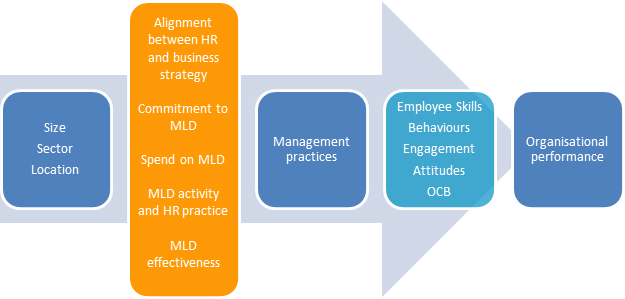The business case for leadership and management skills
1 Apr 2015
Penny Tamkin, IES Associate Director

Management and Leadership skills have been associated with a wide range of outcomes of importance – productivity, innovation, employee safety and wellbeing, and employee engagement for example. All too often, that knowledge is understood in the abstract but makes no difference in terms of how we behave in organisations. If that is so in organisations, it is even more marked on a national level. IES has recently supported the States of Jersey in exploring the quality of its management and leadership, the factors that influence that quality, and how these issues link to organisational performance. We have sought to better understand the capability of managers and leaders across the Island, the impact of that on performance and the factors that influence that capability. This has led us to develop detailed recommendations for organisations and for the States of Jersey itself.
The catalyst for this work was a 2012 study published by the Chartered Management Institute (CMI),1 which sought to link management development to organisational outcomes. This study concluded there was clear evidence that the level of investment in management and leadership development (MLD), the alignment of HR and business strategy, and the commitment to MLD within an organisation, alongside effective HR practices and the evaluation of MLD, have a significant impact on organisational performance. The States of Jersey had already identified that management and leadership skills were likely to be crucial in facing the challenges facing it: the need for significant public sector reform; the identification of management and leadership skills challenges in specific sectors; and ambitions for growth across the Jersey economy.
The Jersey Management and Leadership Chain

* OCB = Organisational Citizenship Behaviour. Source: IES, 2014
In response, IES worked with IFF to survey organisations across the Island, representative of all sectors and sizes. The survey repeated large parts of the CMI survey (with kind permission) and added some key questions on talent issues and management practices to further explore the links with performance.
The findings show that there is a clear link between MLD, management effectiveness, and organisational performance. High-performing organisations show:
- A greater alignment between HR activity, and MLD and business strategy.
- Greater commitment to MLD.
- More positive feelings about the MLD they provide.
- More sophisticated management practices.
We found that a chain of impact can be established for Jersey (see Figure below). A range of organisational characteristics (including size and sector) are important in setting the context for leadership development and influence the amount of development offered and general approaches to MLD. Attitudes and practices such as MLD activity, its quality, and the alignment with the business strategy, in turn have a significant impact on management and leadership capability and practice. Bettermanagement and leadership capability and practice are associated with higher levels of organisational performance (other research2 strongly suggests that this is through their effect on the skills, behaviours, engagement and attitudes of the workforce).
These findings provide a strong business case for the value of management and leadership skills across the Jersey economy and also offer a firm base for a range of targeted recommendations for employers and for the Jersey Skills Board and its partners to raise capability and help the island face the challenges ahead.
This research has now been published by Jersey Skills and can be downloaded from their website.
If you are interested in finding out more about how MLD can impact your organisation, please contact penny.tamkin@employment-studies.co.uk
Footnotes
- Dr Richard McBain, Professor Abby Ghobadian, Jackie Switzer, Petra Wilton, Patrick Woodman and Gemma Pearson, (2012) The Business Benefits of Management and Leadership Development, CMI, London.
- Eg Purcell et al 2003 Understanding the People Performance Link – Unlocking the Black Box, CIPD, London


